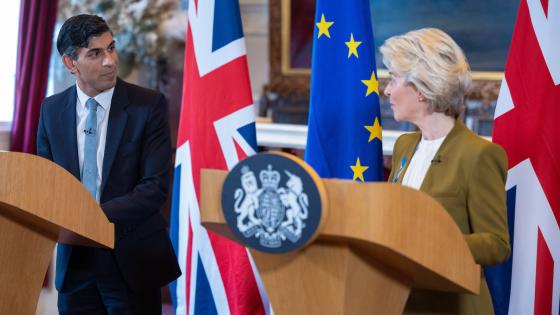After decades of ever closer integration, the British vote for Brexit marks the first step of disintegration in Europe. Yet, if pursued wisely, this does not have to mean that the integration process is terminated. European integration still carries the promise of enduring peace and growing prosperity if European policymakers take Europe’s defining adage “unity in diversity” seriously and foster a fruitful contest of ideas and approaches, as originally intended by the internal market’s founding fathers.
The overarching principle guiding this process should be the concept of subsidiarity: deeper integration should happen only in those areas where joint action effectively leads to better results. One should expect security policy, asylum policy and climate policy to be candidates for such a joint approach. In other areas – notably fiscal policy, labour market and social policy – European citizens tend to display too diverse preferences. Thus, they expect their governments to accept responsibility for policy choices rather than to give up national sovereignty.
The background of the Brexit decision
The small margin leading to the Brexit vote is proof of a deep division of the British society. Obviously, some fundamental sources of discontent allowed the shallow arguments of the populist Brexiteers to become so successful. The decision is a vote of no confidence, albeit hardly a very constructive one, against the British elites. It also voices a protest against the forces of globalisation and the associated increase in economic inequality (Keller and Utar 2016).
However, the problem has not exclusively been homemade but it is also a reflection of a perceived democratic deficit of the EU. This has given rise to protests against the allegedly unbearable shackles of regulations imposed by “Brussels”, which has found its most visible expression in the rejection of immigration to Britain. This has been possible despite the historical openness of the country and despite the freedom of movement as one of the most important achievements of European integration for all Europeans. Until this day, however, European integration has predominantly been a project of the European elites.
It is still sensible, after all, to view the process of European integration as a common project to foster peace and prosperity in Europe. The peaceful atmosphere Europeans have enjoyed throughout the last decades should not be taken for granted, as is evidenced by the many new security risks that have emerged in recent years. Moreover, the recent economic crisis in the Eurozone has demonstrated quite impressively that there is no guarantee for stable prosperity growth in Europe.
Rather, the member states need to strive more intensively for international competitiveness on labour and product markets. A core aspect in this endeavour would be the completion of the European internal market. This would accelerate the adaptation of economic actors to the process of globalisation, based on a deeper international division of labour and a fruitful contest of ideas. Yet, the internal market remains incomplete, and its fruits are still waiting to be harvested in their entirety (Feld et al. 2016a).
An important reason for this impasse is the insufficient effort by member states’ governments to make their electorates aware of the chances arising from this process. European citizens should have been informed that European integration will require an even greater readiness to perform. Instead, they were misled into believing that Europe was most of all a promise of protection from the vicissitudes of global competition. This has never been a credible promise, though, given – among others – the dynamic developments in the emerging economies, especially in Asia. As the Brexit decision indicates, many Europeans nevertheless seem to follow this pretence and think that they would be better off without European integration.
Decisions to be avoided
Time and again, economists have been well advised to adapt their forecasts cautiously upon the arrival of new information. Therefore, it seems unwise to exaggerate the short-term consequences of the Brexit decision. But clearly, the close economic ties between the UK and the EU make it all but unavoidable that negative repercussions will arise along the way. The uncertainty about the new set of arrangements will in all likelihood lead to reduced trade and lower investment in the UK, the rest of Europe and perhaps even beyond (Baldwin 2016, Campos and Coricelli 2015, Dhingra et al. 2016, IMF 2016, OECD 2016).
From an economic perspective, the new arrangements will create winners and losers, with the group of losers possibly outnumbering the winners. To limit the losses, the UK itself has an utmost interest in retaining its access to the European market. The EU is also highly interested in limiting the impediments of trade with the UK. But the EU also needs to contain the long-term repercussions of the Brexit, which might take the form of other member states following the British example. It therefore seems sensible advice to European policymakers to assume a stance of balance in the ensuing Brexit negotiations – retaining a positive attitude, but remaining tough in substance. In any case, the EU needs to avoid the signal that non-EU economies could enjoy the privileges of member states without accepting their obligations.
Article 50 of the Lisbon Treaty presents the parties negotiating an exit from the EU with a two-year timeframe from the time that a member state files for divorce until its membership expires. Given all the uncertainties triggered by the Brexit vote this time seems quite long at first glance. Yet, it has taken a long time and many unfortunate decisions to arrive at that point. One can hardly expect a resolution of this impasse within a much shorter time. This interim period also provides an opportunity to critically reassess the previous process of European integration – and to correct the mistakes and omissions committed along the way.
Specifically, the EU would be ill-advised to pursue an adamant strategy of an “ever closer union” (GCEE 2015). Institutional deepening is only a tool to foster the ultimate objectives of peace and prosperity in Europe, it is not an objective in itself. To hastily decide on further integration – say, in the direction of a European Social Union – would hardly be a sustainable approach. This strategy would pretend that a prosperous Europe could be ascertained by founding a fortress against the forces of globalisation.
It should rather be the objective of EU policymakers to devise a process of European integration that fortifies Europe’s competitiveness to such an extent that it makes the advantages of EU membership transparent to member states’ citizens and thereby fosters their identification with the European project. The advantages of European integration are real, since – by contrast to the suggestions made by right-wing populists all around Europe – several of the unavoidable present-day challenges can hardly be dealt with at national level. Security policy is a case in point. Moreover, foregoing the benefits of continuing access to the European internal market can hardly be a promising way to ensure prosperity in an increasingly globalised world economy.
Searching for stable arrangements
Thus, the major task for European policymakers is to search for a robust architecture for an integrated Europe. All promising candidate proposals satisfy the same principal requirement: effective control of fiscal and economic policy decisions needs to be aligned with liability for their consequences at the same government level. Regarding financial markets, the European Banking Union – the counterpart to the common monetary and exchange rate policy in the Eurozone – satisfies this fundamental requirement, as the alignment was realised at European level.
When it comes to fiscal and economic policy decisions, though, the situation is quite different. It seems safe to conclude that the current sentiment of the electorates in many EU member states hardly favours relegating the national sovereignty for these decisions to the European level. Member states are not prepared to cede sovereign control of their taxes and spending policies to a government of a European federal state (Resiliency Authors 2016). It therefore seems sensible to retain national sovereignty for fiscal and economic policy decisions and to prevent joint liability for their consequences by committing to the no bail-out principle. The German Council of Economic Experts has devised a concept for implementing these considerations, aka ‘Maastricht 2.0’ (GCEE 2015, Feld et al. 2016a).
As no comparable concept was in place at the time, the Eurozone was ill-prepared for the existential crisis of the last couple of years. The preventive measures installed were insufficient, and as the crisis emerged, new measures for crisis management needed to be devised step-by-step. Throughout recent years, the Eurozone’s institutional reforms, for instance the Fiscal Compact, have moved it into the direction of Maastricht 2.0, strengthening the case for member states’ national responsibility for sustainable public finances and international competitiveness.
And yet, the concept of Maastricht 2.0 is still incomplete (GCEE 2015, Feld et al. 2016b). The responsibilities for conducting monetary policy and supervising banks and insurance companies should be separated to avoid conflicts of interest. The vicious link between banks and sovereigns should be severed, especially via a removal of the privileges for exposures towards sovereigns in banking regulation (Andritzky et al. 2016c). The credibility of the no bail-out clause should be strengthened by introducing a mechanism for sovereign debt restructuring (Andritzky 2016a; Andritzky 2016b).
Reforms such as these would redirect the responsibility for the consequences of political actions to those who effectively make these decisions: the member states’ governments. They would be prevented from taking the easy route for explaining unpopular decisions, that of blaming “Brussels and Berlin”. This would, among other things, make transparent that the need for a consolidation of public finances – which so often is blamed on the “austerity policy” imposed by outsiders, i.e. Germany – is nothing else but the unavoidable consequence of bad domestic policy decisions made in the past (Feld et al. 2015).
To keep the promise of fostering economic prosperity, Europe needs to find ways to strengthen international competitiveness in factor and product markets. In this endeavour, European programmes are not a substitute for national efforts (Breidenbach et al. 2016). By contrast, structural reforms have the potential to ascertain international competitiveness on factor and product markets. Only national governments can effectively identify impediments for growth in their countries and develop economic reforms tailored to alleviate these impediments; and only they have the political mandate and the ability to communicate the purpose and the intention of such reforms to their electorates (Schmidt 2015).
References
Andritzky, J., L.P. Feld, Ch.M. Schmidt, I. Schnabel, and V. Wieland (2016a), Creditor Participation Clauses: Making No Bail-Out Credible in the Euro Area. In: Allen, F., E. Carletti, J. Gray and G. M. Gulati (eds.), Filling the Gaps in Governance: The Case of Europe. European University Institute, 67-74.
Andritzky, J., D.I. Christofzik, L.P. Feld, and U. Scheuering (2016b), A Mechanism to Regulate Sovereign Debt Restructuring in the Euro Area, mimeo, German Council of Economic Experts, Wiesbaden.
Andritzky, J., N. Gadatsch, T. Körner, A. Schäfer, and I. Schnabel (2016c), "A Proposal for Ending the Privileges for Sovereign Exposures in Banking Regulation", VoxEU, 4. March.
Baldwin, R. (2016), "The Economics of Brexit: Pre-Referendum Videos and Columns on VoxEU.org", VoxEU, 12 July 2016.
Breidenbach, Ph., T. Mitze, and Ch.M. Schmidt (2016), "EU Structural Funds and Regional Income Convergence – A Sobering Experience", CEPR Discussion Paper 11210.
Campos, N.F., F.C. Coricelli (2015), "Some Unpleasant Brexit Econometrics", VoxEU, 11 December 2015.
Dhingra, S., H. Huang, G.I.P. Ottaviano, Th. Sampson, and J. Van Reenen (2016), "The Consequences of Brexit for UK Trade and Living Standards", VoxEU, 04 April 2016.
Feld, L.P., Ch.M. Schmidt, I. Schnabel, B. Weigert, and V. Wieland (2015), "Greece: No escape from the inevitable", VoxEU, 20. Februar 2015.
Feld, L.P., Ch.M. Schmidt, I. Schnabel, and V. Wieland (2016a), "Causes of the Eurozone Crisis: A nuanced view", VoxEU, 22. März 2016.
Feld, L.P., Ch.M. Schmidt, I. Schnabel, and V. Wieland (2016b), "Completing Maastricht 2.0 to safeguard the future of the Eurozone", VoxEU, 23. März 2016.
GCEE (German Council of Economic Experts) (2015), Special Report: Consequences of the Greek Crisis for a More Stable Euro Area, Wiesbaden, 28. July 2015.
IMF (International Monetary Fund) (2016), United Kingdom: Selected Issues, IMF Country Report No. 16/169.
Keller, W. and H. Utar (2016), "Globalisation and polarisation in the Wake of Brexit", VoxEU, 05 July 2016.
OECD (Organisation for Economic Co-operation and Development) (2016), "The Economic Consequences of Brexit: A Taxing Decision", OECD Economic Policy Paper No. 16, April 2016.
Resiliency Authors (2016), "Making the Eurozone More Resilient: What is Needed Now and What Can Wait?", VoxEU, 25 June 2016.
Schmidt, Ch.M. (2015), Designing and Communicating Structural Reforms in the Euro Area: the Unequivocal Responsibility of Member States’ Governments. In: European Central Bank (ed.), Inflation and Unemployment in Europe – Conference Proceedings. Frankfurt: European Central Bank, 193-200.






